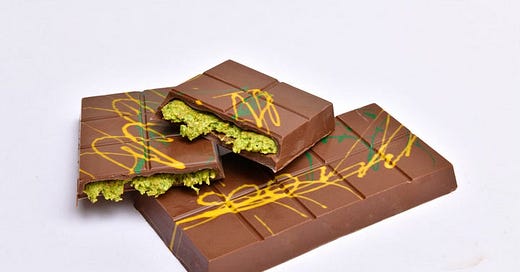Dubai Chocolate: A Sweet Success or Overexposure?
The rise of Dubai chocolate is a marketing triumph, but has its overexposure left a bitter taste?
Dubai chocolate has become a global sensation, celebrated for its luxurious branding and exotic allure. But ask anyone who’s been inundated with its marketing, and you might hear a different story. The constant barrage of advertisements and social media posts has left many feeling more overwhelmed than intrigued.
Personally, I’ve reached my limit. At this point, the sight of anything labeled “Dubai chocolate” is enough to make me turn away. Perhaps it tastes amazing—I wouldn’t know. I’ve never tried it. Why? Because when something is marketed so aggressively, I instinctively pull back. Overexposure makes me skeptical, and I’m not alone in feeling this way.
What’s ironic is how much of this trend was fueled by everyday people. The explosion of Dubai chocolate wasn’t just about big-budget ads; it grew because social media users shared videos of themselves making their own versions at home or gifting it at work. These posts became viral, adding to the frenzy, until the chocolate wasn’t just a treat—it was a status symbol.
But here’s where things get messy. A product that could have been appreciated for its taste and quality has now become more about the hype. It feels like the chocolate itself is overshadowed by the relentless marketing machine behind it. And instead of building excitement, it’s making some of us—myself included—feel indifferent or even resistant.
This over-promotion raises questions about the balance between marketing and authenticity. Are people still interested in Dubai chocolate for its flavor, or is it just another trend they feel pressured to follow? More importantly, will it still be relevant once the hype dies down?
The lesson here isn’t just about chocolate; it’s about the risk of over-marketing. When a product becomes so ubiquitous that it feels inescapable, it can lose its charm—even before someone gets a chance to try it.





Thank you so much! You've made an excellent point. Social media's influence, especially in luxury destinations like Dubai, certainly shapes trends in fascinating ways. This balance is definitely worth discussing and was one of the main goals of the article.
However, I'd like to add that marketing strategies like these can sometimes backfire and alienate their audience. For instance, many people I know, including myself, tend to avoid trying certain products simply because of the overwhelming amount of advertising. It's not just about Dubai chocolates—for example, I recently saw "Dubai baklava" in a local pastry shop. It's not the fault of Dubai, the brand, or even the advertisements themselves, but rather the way people overuse marketing without fully understanding the strategy, which can end up driving customers away.
Thank you once again for your thoughtful comment and contribution! :)
Great article! I believe the rise of Dubai’s chocolate trends is an interesting reflection of how social media can amplify certain narratives. While the luxury appeal of Dubai certainly drives creativity and innovation, it also seems to contribute to a sense of over-marketing. The hype surrounding the city as a luxury destination often leads to trends being exaggerated or overly polished for the sake of appearances. It’s fascinating to see how this balance between authentic innovation and social media-driven marketing plays out in the world of artisan chocolate.